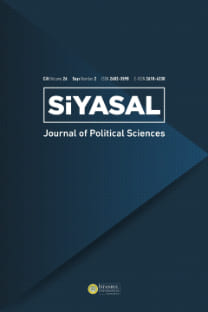Küresel sosyete ülkeleri ve ötekileştirilmiş avamlar: İnşa edilmiş egemenlik kabramı üzerine " 3. Dünya " cılığın bir eleştirisi
“Global society states” and oterhered commons: A critic of third worldism based on sovereigny as a social construct
___
- Acar, Cemal, Soğuk Savas Dönemi Süper Güçlerin Hâkimiyet Kavgası, (Ankara: Mm Yayıncılık), 1991.
- • Anderson, Bedenict, Imagined Communities, (New ed.), London, New York: Verso, 2006.
- • Austin, J.L. How To Do Things With Words, Second Edition, Oxford University Press, 1962.
- • Beer, Francis A. ve Robert Hariman (der.), Post Realism: Rhetorical Turn in International Relations, MSU Pres, 1996.
- • Bull, Hedley, The Anarchical Society: A Study of Order in World Politics, New York: Columbia University Pres, 1995 [1977].
- • Campbell, David, Writing Security: United States Foreign Policy and the Politics of Identity, Minneapolis: University of Minnesota Press, 1992.
- • Correlates of War Project, National Capabilities Data Documentation, Version 3.0.
- • Dahl, Robert A., “The Concept of Power”, Behavioral Science, 2 (1957), 202-203.
- • Davutoğlu, Ahmet Stratejik Derinlik: Türkiye’nin Uluslararası Konumu, Küre Yayınları, 2001.
- Deutsch, Karl M., The Nerves of Government: Models of Political Communication and Control, New York: The Free Press, 1963
- • Deutsch, Karl M., The Analysis of International Relations, Englewood Cliffs, N.J.: Prentice Hall, 1968.
- • George, J im, Discourses of Global Politics: A Critical (Re)Introduction to International Relations,Boulder: Lynne Reinner, 1994.
- • Jackson, R.H and P. Owens, “The Evolution of World Society” (içinde) John Baylis and Steve Smith (der.). The Globalization of World Politics: An Introduction to International Relations, Oxford: Oxford University Press, 2005.
- • Kapani, Münci Politika Bilimine Giris, Bilgi Yayınevi, 2001.
- • Kipling, Rudyard, “The White Man's Burden,” McClure's Magazine 12 (Feb. 1899).
- • Lakoff, George and Mark Johnson. Metaphors We Live By. Chicago: University of Chicago Press, 1980.
- • Laswell Harold D. and Abraham Kaplan, Power and Society, (New Haven: Yale University Press, 1950.
- • Morgenthau, Hans J., (Revised by Kenneth W. Thompson) Politics among Nations: The Struggle for Power and Peace. Mc Graw Hill, 1993 [1948].
- • Neumann, Iver “Making Europe: The Turkish Other”, içinde Iver Neumann, Uses of the Other, The “East” in European Identity Formation, Minneapolis, University of Minnesota Press, 1999, ss. 39-63.
- • Ó’Tuathail, Gearóid, Critical Geopolitics, Minneapolis: University of Minnesota Press, 1996.
- • Said, Edward Orientalism, London, Penguin Books, 1978.
- • Shapiro, Michael Reading the Postmodern Polity, Minneapolis: University of Minnesota Pres, 1992.
- • Stone, Leonard A., “Late Ottoman and Modern Turkish Perceptions of Europe: Continuity and Change”, Turkish Studies, Vol. 3 (2), (Autumn 2002), ss. 181-199.
- • Vali, Frenc A., Bridge Across the Bosporus, Baltimore: John Hopkins University Press, 1971.
- • Wallerstein, Immanuel The Modern World-System, New York: Academic Press, 1974.
- • Walker, R. B. J. Inside/Outside: International Relations as Political Theory, New York: Cambridge University Press, 1993.
- • Waltz ,Kenneth N., “Reductionist and Systemic Theories” ve “Political Structures” Robert O. Keohane (der.), Neorealism and Its Critics, New York: Columbia.
- • Wendt, Alexander and Daniel Friedheim “Hierarchy Under Anarchy: Informal Empire and the East German State”, International Organization, 49, 689-721, 1995.
- • Wight, Martin Systems of States, Leicester University Press and London School of Economics, 1977.
- • Thucydides, “Melyan Diyaloğu,” Pelopenez Savasları Tarihi http://www.mtholyoke.edu/acad/intrel/melian.htm
- ISSN: 1303-1260
- Yayın Aralığı: 2
- Yayıncı: İstanbul Üniversitesi
Yerel siyasette temsil üzerine bir çalışma: Şanlıurfa örneği
Uluslararası insancıl hukuk ve İsrail'in Gazze harekatı
Doğu Avrupa'da radikal neo-liberal dönüşüm
"Bağlantısız üçüncü dünya" dan "çevre ülkeleri"ne
Demokrasi ve istikrar açısından parlamenter ve başkanlık hükümet şekli karşılaştırılması
Mısır'da ekonomik kalkınma çabaları
Küresel kalkınma paradigmasının evriminde kurumsal etkenler ve dünya bankası
